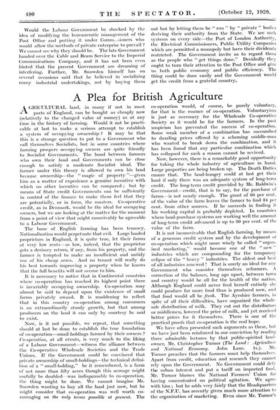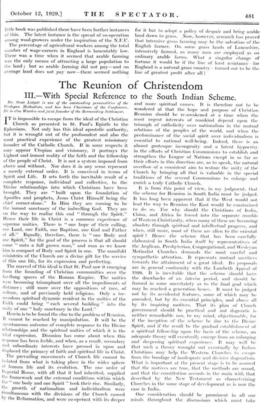A Plea for British Agriculture
AGRICULTURAL land, in many if not in most parts of England, can be bought as cheaply now (relatively to the changed value of money) as at any time in the history of farming. Would it not be practi- cable at last to make a serious attempt to establish a system of occupying ownership ? It may be that this is a strange question to put to a Government who call themselves Socialists, but in some countries where farming prospers occupying owners are quite friendly to Socialist Governments. The bond between farmers who own their land and Governments can be close enough to satisfy a moderate Socialist ideal. The farmer under this theory is allowed to own his land because ownership—the " magic of property "—gives him as a matter of experience a genuine incentive with which no other incentive can be compared ; but by means of State credit Governments can be sufficiently in control of the finance to make them feel that they are potentially, or in form, the masters. Co-operative credit, as in Denmark, would be the ideal for occupying owners, but we are looking at the matter for the moment from a point of view that might conceivably be agreeable to a Labour Government.
The bane of English farming has been tenancy. Nationalization would perpetuate that evil. Large landed proprietors in England, it is quite true, let their farms at very low rents—so low, indeed, that the proprietor gets a derisory return, if any, from his property, and the farmer is tempted to make an insufficient and untidy use of his cheap acres. And no tenant will really do his best towards improving a property when he knows that the full benefits will not accrue to him.
It is necessary to notice that in Continental countries where co-operation has reached its highest point there is invariably occupying ownership. Co-operation may almost be said to depend upon the existence of small farms privately owned. It is maddening to reflect that in this country co-operation among consumers is an extraordinarily sturdy growth, but that among producers on the land it can only by courtesy be said to exist.
Now, is it not possible, we repeat, that something should at last be done to establish the true foundation of co-operation—small loldings farmed by their owners ?
Co-operation, at all events, is very much to the liking of a Labour Government—witness the alliance between the Co-operative Wholesale Societies and the Trade Unions. If the Government could be convinced that private ownership of small-holdings—the technical defini- tion of a " small-holding," be it remembered, is a farm of not more than fifty acres though this acreage might usefully be doubled—was indispensable to co-operation, the thing might be done. We cannot imagine Mr. Snowden wanting to buy all the land just now, but he might consider that co-operation was well worth en- couraging on the only terms possible at present. The co-operation would, of course, be purely voluntary, for that is the essence of co-operation. Voluntaryism is just as necessary for the Wholesale Co-operative Society as it would be for the farmers. In the past suspicion has prevented the success of co-operation. Some weak member of a combination has succumbed to dazzling prices offered by a scheming middle-man who wanted to break down the combination, and it has been found that any particular combination which has collapsed for such a reason cannot be revived.
Now, however, there is a remarkably good opportunity for taking the whole industry of agriculture in hand. Large properties are being broken up. The Death Duties ensure that. The land-hungry could at last get their land if only there was an adequate system of long-term credit. The long-term credit provided by Mr. Baldwin's Government—credit, that is to say, for the purchase of farms—is not nearly enough. The grant of 66 per cent. of the value of the farm leaves the farmer to find 34 per cent. from other sources. .If he succeeds in finding it his working capital is probably depleted. In countries where land-purchase systems are working well the amount of long-term credit advanced is up to 90 per cent. of the value of the farm.
It is not inconceivable that English farming, by means of a generous credit system and by the development of co-operation which might more wisely be called " organ- ized marketing," would become one of the " new " industries which are compounding for the- temporary eclipse of the " heavy " industries. The oldest and best of all industries renewed ! That is surely an ideal for any Government who consider themselves reformers. A correction of the balance, long ago upset, between town and country would be all for the health of the nation. Although England could never feed herself entirely she could produce far more food than is produced now, and that food would all be fresh. The Ayrshire farmers, in spite of all their difficulties, have organized the whole- sale distribution of milk. They cut out the distributors or middlemen, lowered the price of milk, and yet received better prices for it themselves. There is one of tile practical proofs that co-operation is the real hope.
We have often presented such arguments as these, but we have just been reinforced in our conviction by reading three admirable lectures by that public-spirited land- owner, Mr. Christopher Tumor (The Land : Agriculture and National Economy. John Lane. is.). Mr. Tumor preaches that the farmers must help themselves. Apart from credit, education and research they cannot rely upon the Government. No Government could defy the urban interest and put a tariff on imported food. Mr. Tumor blames the National Farmers' Union for having concentrated on political agitation. We agree with him ; but he adds very fairly that the' Headquarters of the N.F.U. has recently given much more attention to the organization of marketing. Even since Mr. Tumor's little book was published there have been further instances of this. The latest instance is the spread of co-operation among wool-growers under the inspiration of the N.F.U.
The percentage of agricultural workers among the total number of Wage-earners in England is lamentably low. There was a time when it seemed that arable farming was the only means of attracting a large population to the land ; but as arable farming did not pay—and on average land does not pay now—there seemed nothing for it but to adopt a policy of despair and bring arable land down to grass. Now, however, research has proved that intensive grass farming may be the salvation of the English farmer. On some grass lands of Lancashire, intensively farmed, as many men are employed as on ordinary arable farms. What a singular change of fortune it would be if the line of least resistance--for England is a natural grass country—turned out to be the line of greatest profit after all !









































 Previous page
Previous page